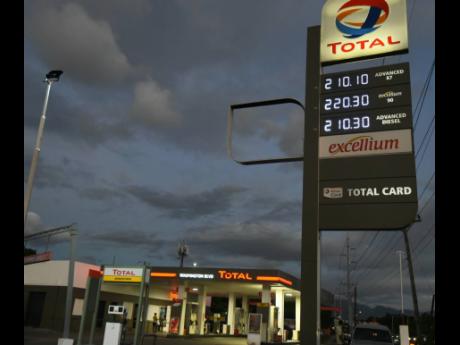OIL SKID LOOMS
Pump prices set to soar amid Ukraine war tensions
The Jamaican Government is being urged to treat the massive fallout in global oil markets triggered by weeks-long escalation in tensions and Russia’s declaration of war on Ukraine as a national emergency.
The ripple effects could worsen consumer pain amid price hikes for basic commodities and January inflation of almost 10 per cent.
Opposition Spokesman on Energy Phillip Paulwell believes that the dramatic implications of the surging oil prices on Jamaica’s economy demand that Cabinet should be meeting now, “almost establishing a war room” to address the crisis.
“I see this as a national emergency for Jamaica and that it should be treated as such, which means that both Government and Opposition should be in closer consultation on how to minimise the impact on the Jamaican people,” he told The Gleaner on Thursday.
In a Gleaner interview, Paulwell said that the Government should have anticipated the surge in global oil prices, noting that the impact was likely to “almost overnight translate into tremendous hardships and difficulty for the already struggling economy.
“My understanding is that the Budget is crafted on the basis of fuel being somewhere in the region of about $60-odd dollars. For the most of the life of this Budget, you are going to see the price over US$100 per barrel,” said Paulwell of the J$912-billion Estimates of Expenditure for the 2022-2023 fiscal year.
He reasoned that the Government would have to make a substantial readjustment based on its projections at a time when civil servants are slated to receive improved emoluments under the Ministry of Finance and the Public Service’s compensation-restructuring exercise.
Acknowledging the challenge faced by the country amid the unfolding war in Eastern Europe, Telroy Morgan, manager of strategic planning and business support at Petrojam, said that the company has seen postings of between US$140 and US$150 per barrel in the short to medium term.
Morgan argued that the early days of the Ukraine conflict forebodes worse to come in the oil markets if Russia’s military operation persists.
He said that there was a moderate decline in Petrojam’s ex-refinery price on Wednesday, but recent Glea ner analysis showed that there has been a double-digit rise in fuel prices locally over the last three months. Compounded by the recent explosion at a major oil refinery in New Orleans, the price of petrol is expected to rise further.
Morgan urged motorists to make a deliberate effort to conserve on fuel and to use 87-octane in instances where the car was made to use that grade of petrol.
The strategic planning manager said that when Petrojam examined the data on petrol use, it was found that there was an insatiable appetite in Jamaica for 90-octane, which is more expensive than 87 octane.
Morgan is of the view that the majority of vehicles in Jamaica can use 87-octane.
Meanwhile, Paulwell said that after being battered by the effects of the COVID-19 pandemic over the last two years, the country had been poised to “see some light” at the end of the tunnel. But the new threat could damper hopes of a robust recovery.
For the first time since 2014, the price of oil has shot past US$100 per barrel, and the cost of liquefied natural gas has risen by more than 40 per cent in one night, according to Paulwell.
This escalation in prices, said the former energy minister, would continue for not only as long as the war lasts, but until the litany of sanctions imposed on Moscow by the United States and other members of the G-7 would be lifted.
“We do not believe that world oil supplies and natural gas will be able to offset this shortage that will result,” he said.
Paulwell argued that there would be a significant demand for oil even as the world economy rebounds from the pandemic, which could create a perfect storm for another major energy crisis similar to that of the 1970s and the late 1980s.
Commenting on projections of between US$140 and US$150 per barrel for oil, the opposition spokesman resurrected his criticism of the Holness administration’s taxation policy. Fuel and other taxes comprise almost half of petrol costs, industry interests have said.

